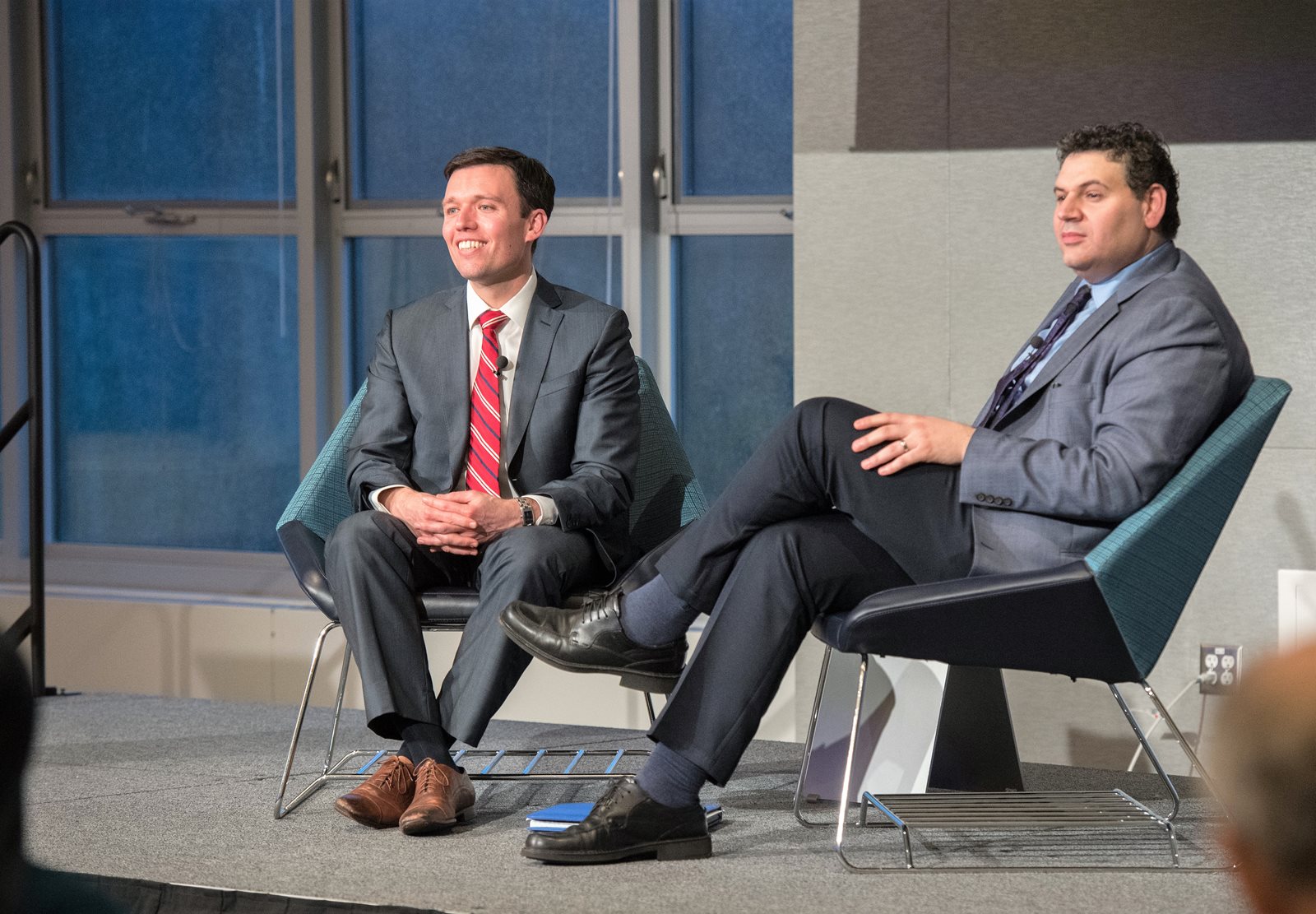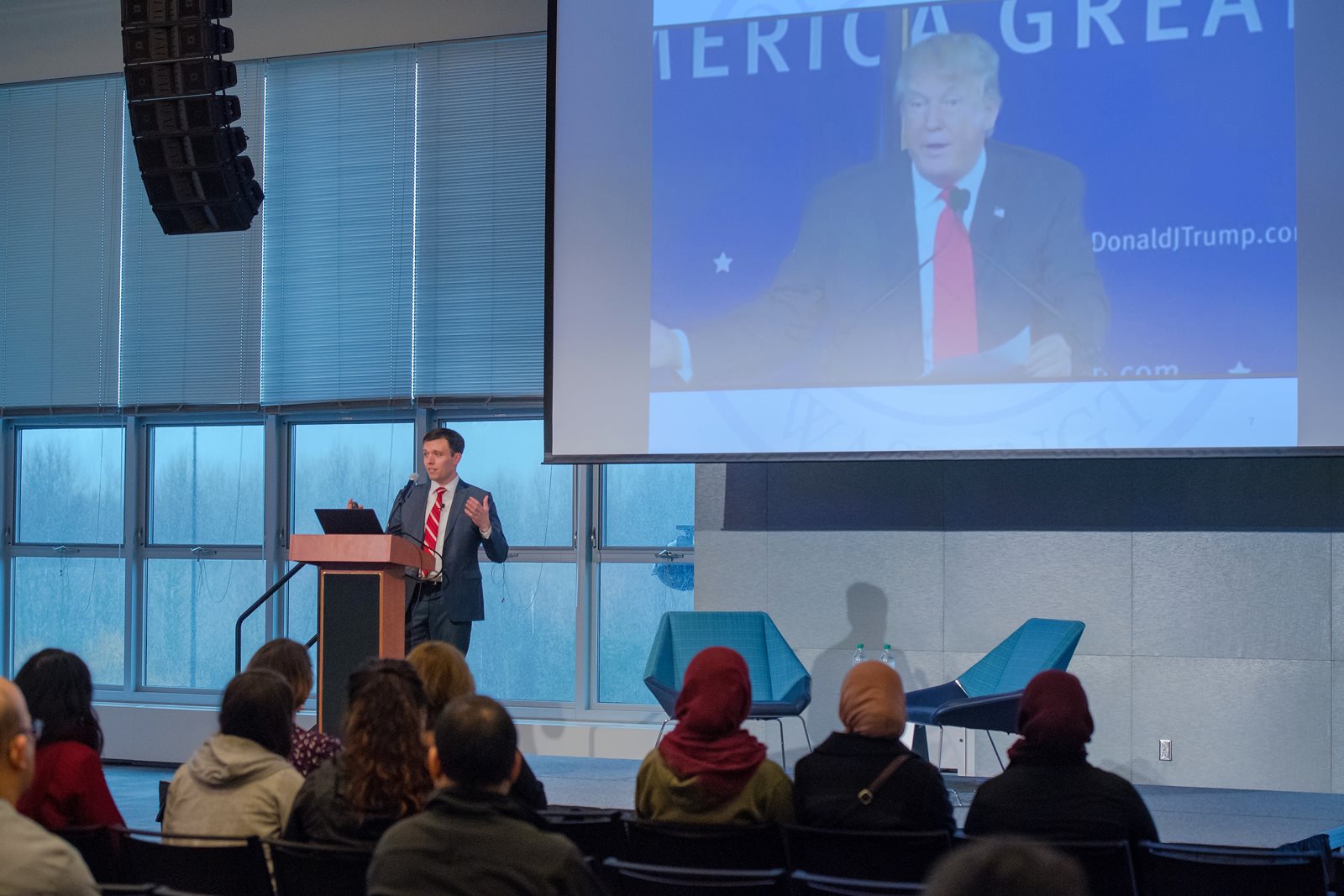
Washington was the first state to challenge the constitutionality of the travel ban President Donald Trump issued as an executive order shortly after taking office.
Attorney General Bob Ferguson gave Solicitor General Noah Purcell the go-ahead to challenge the ban, even though they did not think it would be a popular move, Purcell said Thursday in a presentation to more than 100 students, faculty and staff at the Activities and Recreation Center.
As Purcell told the audience, they believed the ban was neither legal nor justifiable. “This is not OK. This is not acceptable. This is not who we are as a country.”
The presentation was sponsored by the University of Washington Bothell’s American Muslim Research Institute, which is headed by Karam Dana, an assistant professor of Middle East politics in the School of Interdisciplinary Arts & Sciences, who moderated a question and answer session.

Noah Purcell with Bob Ferguson, left / courtesy photo
The successful challenge moved at an unusually fast pace and led to a “crazy, crazy day at the courthouse,” an “insane” amount national media attention and an outpouring of letters, most in strong support of the challenge. They included one from a teacher at Purcell’s former grade school, Kimball Elementary in Seattle. A teacher recounted how her family had been rounded up during the incarceration of Japanese-Americans during World War II. Purcell choked up and his eyes watered as he read her letter of thanks to the audience.
Other people who sent letters or who have spoken to him since the ban also said the state’s challenge gave them hope and encouraged them to stay engaged, Purcell said.
“It was almost a cultural experience more than a legal experience,” he said.
The travel ban was issued on Jan. 27, 2017, a Friday. Purcell and a team of state lawyers worked through the weekend to put the lawsuit before a federal judge on the following Monday in Seattle.
Purcell argued the state had “standing” — a key legal point — because the University of Washington, along with other educational institutions and businesses, had faculty, students and employees stranded outside the country. To assist in the court filings, UW officials also worked through the weekend to provide needed documentation. “I was proud to be a Husky,” Purcell said.
After that weekend, which included public demonstrations across the country, District Judge James Robart granted a temporary restraining order, halting the ban nationwide. That ban was subsequently replaced. The U.S. Supreme Court is considering a new travel ban that was allowed to go into effect until it rules.

Marc Studer photo
Arguing the executive order was illegal in part because it was intended to discriminate against Muslims based on their religion, Purcell said that his “exhibit A, B, C, D and E” was a statement Trump made during the presidential campaign in December 2015. Trump called for a “complete shutdown of Muslims entering the United States.”
After his speech at UW Bothell, Purcell answered audience questions about the legal status of the current executive order banning some travel, the role the judiciary plays among the three branches of government, and the role citizens can play in shaping public discourse and future legislation.
Several members of the audience also thanked Purcell for his work. He mentioned that his wife’s mother is from Iran and that his own ancestors were from Italy. Italians were once considered unwelcome immigrants, he said.
“People come here from all over the world, and they become Americans,” Purcell said. “That makes me hopeful.”
Purcell is a native of Seattle who attended the University of Washington. Purcell and his wife, Jasmin Weaver (a former ASUW president), both graduated in 2002 and each received Mary Gates Leadership awards for their work with a UW student group seeking to keep tuition low. They have three children.
Purcell was 33 and one of the youngest solicitors general in the nation when he was appointed in 2013 by Ferguson. A graduate of Harvard Law School, Purcell served as a law clerk to U.S. Supreme Court Justice David Souter and previously worked at the Perkins Coie law firm in Seattle.



